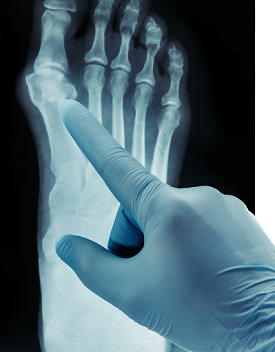 If you’ve recently begun to suspect that something’s not quite right with your feet, and you are experiencing redness, swelling, and tenderness at the base of your big toe, you may be one of the three million Americans with hallux valgus, more commonly known as a bunion. We recently invited Columbia, TN, bunion removal specialist Dr. Danielle Malin to talk with us about the condition.
If you’ve recently begun to suspect that something’s not quite right with your feet, and you are experiencing redness, swelling, and tenderness at the base of your big toe, you may be one of the three million Americans with hallux valgus, more commonly known as a bunion. We recently invited Columbia, TN, bunion removal specialist Dr. Danielle Malin to talk with us about the condition.
Q: What is a bunion?
Dr. Danielle Malin, DPM, FACFAS: A bunion is a deformity of the foot. While bunions are often hereditary, they can also be caused due to external factors such as activities and shoes. This can be painful and make it difficult to comfortably enjoy walking, running, and other types of exercise. Bunions are most common in women that wear tight-fitted heels.
Q: What are the signs/symptoms of a bunion?
Dr. Danielle Malin, DPM, FACFAS: The most obvious is a visible bump on the side of the big toe. While bunion deformities are not reversible, there are options available to slow down the progression. Some patients will need corrective bunion surgery based on their pain level or difficulty with fitting shoes. It’s best to contact your physician or podiatrist if you begin to experience tightness around your toes or if your big toe is swollen or sore more than just occasionally.
Q: Do bunions limit range of motion?
Dr. Danielle Malin, DPM, FACFAS: Absolutely. Our bunion surgery patients often report extremely limited range of motion as well as difficulty and discomfort walking. Many also report that their shoes no longer feel comfortable.
Q: Why are bunions painful?
Dr. Danielle Malin, DPM, FACFAS: Inflammation is one culprit. However, bunions are effectively a deformity of the toe. In other words, the toe is pushed out of its normal position, and this is not natural. Something to keep in mind here is that not all toe pain is caused by bunions. Sometimes the problem is joint dysfunction, which may or may not indicate a bunion.
Q: Is bunion surgery the only option?
Dr. Danielle Malin, DPM, FACFAS: If caught and treated early, no. Some people respond well to self-care measures, which may include splints and wearing wider shoes. Bunion pads and anti-inflammatory medications may also be useful. The longer the condition is left untreated, however, the greater the chance that bunion removal surgery will be necessary.
Premier Foot & Ankle Care was founded in Columbia, TN, by Dr. Danielle Malin. The Board Certified physician offers a host of services directly from her office and at Maury Regional Medical Center. For more information, visit PremierFootAndAnkleTN.com.